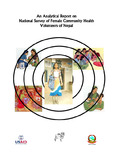Please use this identifier to cite or link to this item:
https://hdl.handle.net/20.500.14356/310Full metadata record
| DC Field | Value | Language |
|---|---|---|
| dc.contributor.author | USAID | |
| dc.contributor.author | NEW ERA | |
| dc.contributor.author | Government of Nepal | |
| dc.date.accessioned | 2013-01-02T19:08:39Z | |
| dc.date.accessioned | 2022-11-08T10:14:18Z | - |
| dc.date.available | 2013-01-02T19:08:39Z | |
| dc.date.available | 2022-11-08T10:14:18Z | - |
| dc.date.issued | 2007 | |
| dc.identifier.uri | http://103.69.126.140:8080/handle/20.500.14356/310 | - |
| dc.description.abstract | EXECUTIVE SUMMARY: Nepal’s nearly 50,000 FCHVs have served as an important source of information for their communities, a link with government health services and a source of direct services in a number of important areas. The 2006 Female Community Health Volunteers (FCHV) national survey, combined with data from routine health information systems and information from the 2006 Nepal Demographic and Health Survey, demonstrate that :FCHVs play an important role in contributing to a variety of key public health programs, including family planning, maternal care, sick childcare, vitamin A supplementation/deworming and immunization coverage. FCHVs are present in nearly all rural wards, stable in their jobs, reasonably representative of the people they serve, and motivated to continue working at current or higher levels. Overall levels of contact between FCHVs and the government health system and their continued training are good in most districts. FCHV performance is closely linked to supplies, support (fo r example from the Nepal Family Health Program) and motivation. With these they can reach a higher percentage of those in need, but without them their performance can fall to low levels. Except for FCHVs with small catchment populations, the available evidence shows that FCHVs may not automatically know about all pregnancies, births, children or other health issues in their area. If they are to provide good service they need to be both motivated to find those in need and families need to understand and expect their role (as with the vitamin A program).There are excellent prospects for the continued functioning of Nepal’s FCHVs and, with well designed and supported programs, they may be able to expand their activities and impact. | en_US |
| dc.language.iso | en_US | en_US |
| dc.publisher | USAID | en_US |
| dc.subject | Female Community Health Volunteers | en_US |
| dc.subject | Nepal | en_US |
| dc.title | An Analytical Report on National Survey of Female Community Health Volunteers of Nepal | en_US |
| dc.type | Technical Report | en_US |
| Appears in Collections: | Post Graduate Grant (PG) Reports | |
Items in DSpace are protected by copyright, with all rights reserved, unless otherwise indicated.

